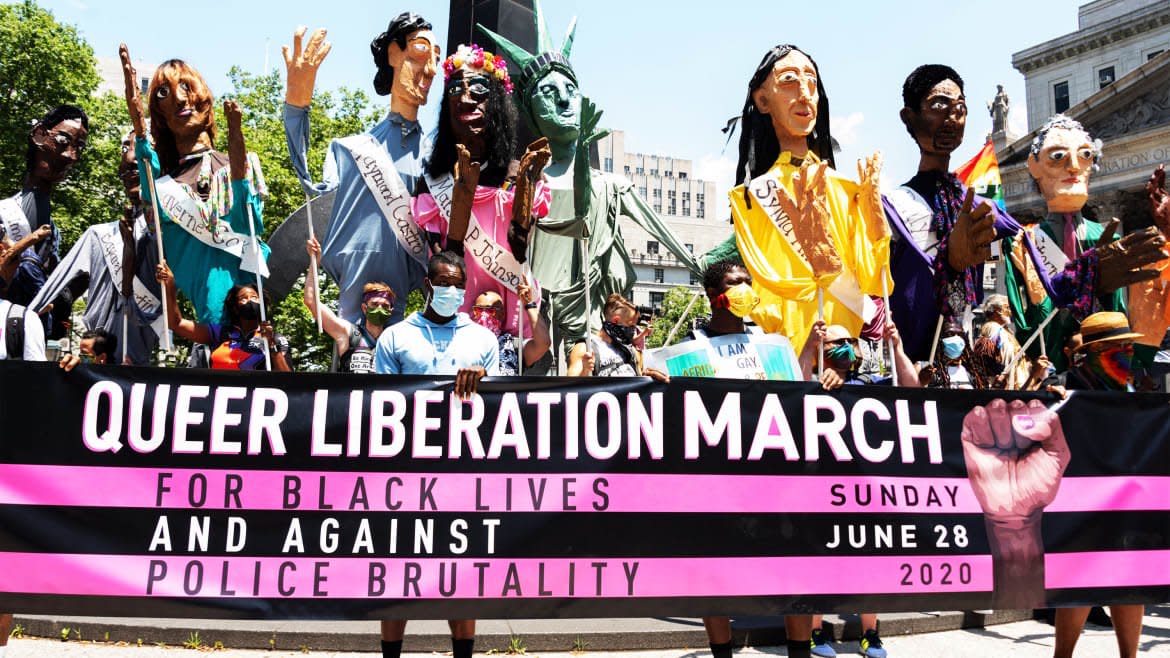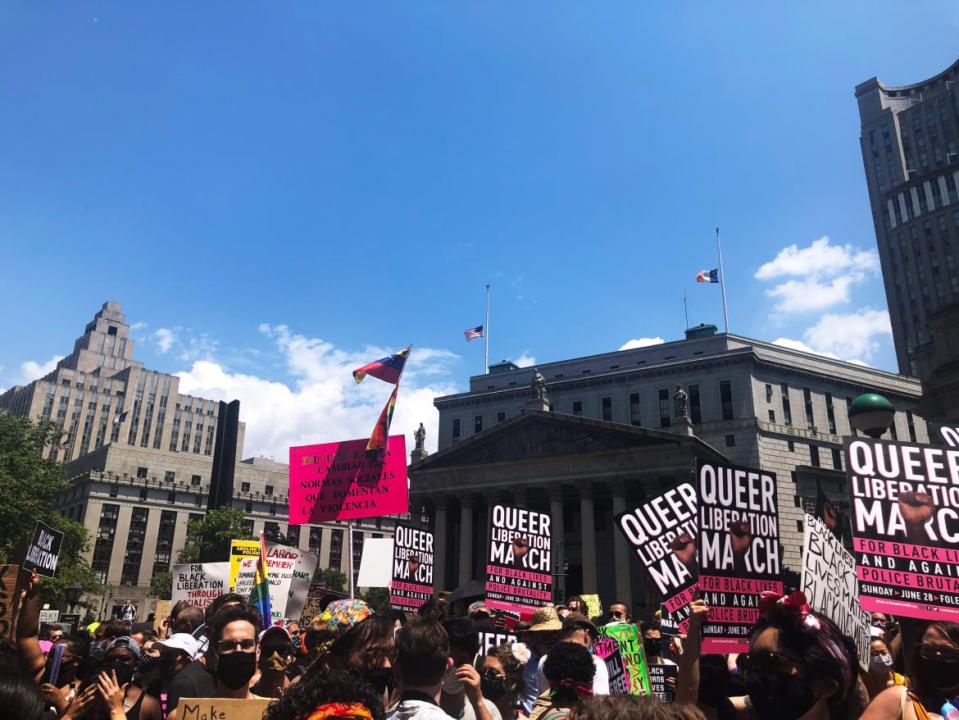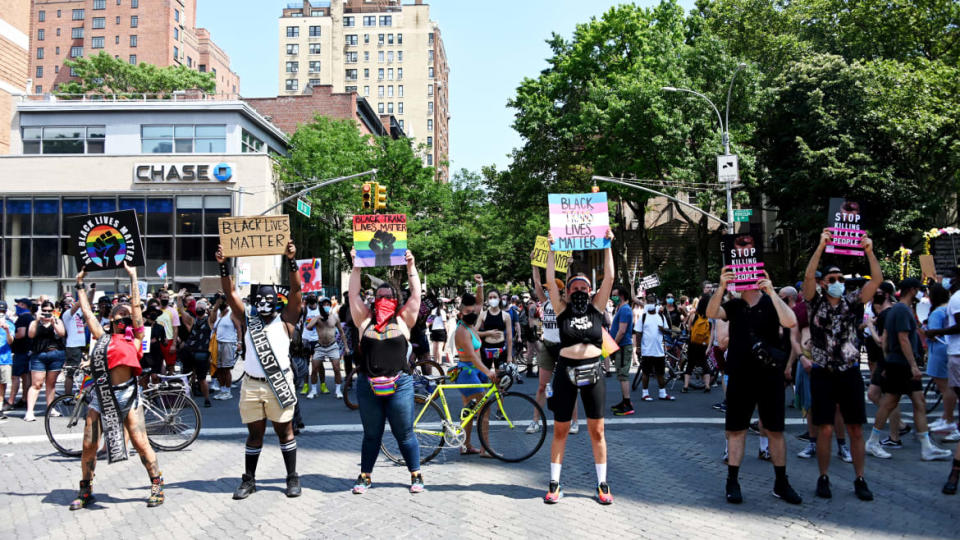Despite Police Confrontation, the Queer Liberation March Was a Powerful and Peaceful Call for Justice

Thousands of protesters flooded the streets of lower Manhattan on Sunday for the Queer Liberation March for Black Lives and Against Police Brutality, a rallying cry against police violence that combined the spirit of Pride with the ongoing calls of the Black Lives Matter movement.
Late afternoon reports on social media showed disturbing moments of confrontation after a largely peaceful march, with the police pushing through crowds of protesters and appearing to detain multiple people.
New York City’s First Ever Queer Liberation March Showed a New-Old Way to Feel Pride
An NYPD spokesperson confirmed to The Daily Beast that two people were arrested in the act of graffiting a police vehicle, and that pepper spray was deployed against those who tried to intervene. (The use of pepper spray was “totally allowed,” the spokesperson said, as intervening in an arrest is illegal.)
Despite videos and social media posts that continue to surface showing police coming after the crowd, a department spokesperson otherwise noted the day’s events were peaceful without “widespread reports of violence or anything of that nature.”
Participants first gathered under the hot midday sun in front of City Hall and made their way north, up past the historic Stonewall Inn and eventually into Washington Square Park. Approaching the West Village, the crowd spanned nearly a dozen city blocks in length.
Similar to the many protests that have continued since the death of George Floyd last month, the march was not city-sanctioned but rather fueled by explicit calls to abolish and defund the police.

Volunteers directed protesters, held traffic, and passed out supplies, while police presence (on foot, in vehicles and at least one helicopter) occasionally rose up on the route’s periphery. Altercations were only reported near the march’s endpoint in Washington Square.
The event marked the 50th anniversary of the city’s first organized march for LGBTQ+ rights (known as Christopher Street Liberation Day) on what was to be New York City’s annual day of Pride celebrations.
With the official parade canceled due to the coronavirus pandemic, the Queer Liberation March restored the political rigor and intent that characterized Pride from its earliest days, with a robust sense of solidarity and defiance in the face of injustice.
New York City Gets Ready for the Battle of the LGBT Pride Marches
The Queer Liberation March was initially canceled as well, but the grassroots group behind the event, the Reclaim Pride Coalition, decided to remount it in the wake of the ongoing uprising over anti-Black racism.
“When we saw the eruption of protests, we were reminded of AIDS-era activism,” Jon Carter, a member of the coalition, told The Daily Beast. “There are times when physical presence in the streets speaks volumes.”
Opposing police violence is one of the founding principles of Reclaim Pride, which organized the first Queer Liberation March last year as counter-programming to the city-approved Stonewall 50 Pride parade and accompanying glut of sponsored events and parties. Reclaim Pride’s resistance to corporate influence, and most especially to police involvement, this year assumed obvious renewed resonance.
New York’s 50th LGBTQ Pride March Should Be as Political as Possible
“We’re tapping into a decades-long intersection” of the broader movements for queer and Black rights, Carter said.
Trans women of color Marsha P. Johnson and Sylvia Rivera, who spearheaded the modern LGBTQ+ rights movement and have rightfully assumed a central place in its history, were among the trailblazers rendered in effigy, towering 20 feet off the ground on the backs of tireless puppeteers.
Carter also pointed out that the founders of Black Lives Matter have personal ties to the queer community. “It’s an ongoing relationship that goes back to the Queer Liberation Front collaborating with the Black Panthers in the ‘60s,” Carter told The Daily Beast. “It’s always been intersectional.”
Signs demanding justice for Layleen Polanco, Nina Pop, Islan Nettles, and other trans women of color rose above the crowd, along with powerful statements that pointed to anti-racism as fundamental to queer liberation (“There is no Pride without Black trans lives”).
While some participants dressed in the colorful, provocative tradition of Pride, the air was decidedly one of resistance and calls for justice.
“I’m here to join everyone in fighting for trans lives, especially Black trans lives,” said Jordana, 26, cooling off in the shade of an awning near Stonewall. “I’m a trans woman, and this year alone, 16 of us have been killed by hate crimes.”
If cis white gay men were subject to that kind of violence, “there would be so much more attention,” said Jordana, a New York native. “It’s so important for us to get out here, even despite the virus, to spread our voice and make the media pay attention to our struggles.”

People stand in a crosswalk holding "Black Lives Matter" signs while stopping traffic during at the Queer Liberation March for Black Lives & Against Police Brutality on June 28, 2020 in New York City.
The crowd in the street chanted: “They can’t deny it, Stonewall was a riot!”
“I’ve been going to a lot of Black Lives Matter protests, and I’m a gay person, and I feel we need to be in the streets and fighting for the rights of Black trans people,” said Todd, 53, an East Village resident who’s been attending Pride events for more than 20 years. “This is what queer Pride should be.”
In Washington Square Park, where exhausted and exuberant protesters gathered and reconnected, a speaker with a microphone told the growing crowd: “If you’re here for a photo opp, you’re here for the wrong reason. If you’re here to put resources toward saving Black trans bodies, I’m here for that!” Benches filled up and small groups sat together on the grass, recharging in the shade.
“This march is not only celebratory, but focused on issues we are still trying to overcome,” said Dylan, 20, draped in a trans flag and waiting to meet up with friends.
“We’re living in a nation where queer life is directly under attack by our government,” Carter from Reclaim Pride told The Daily Beast. “The fact that we’re able to rally together and play a role in protecting the progress we’ve made, and insist on further progress—that’s cause for celebration,” he said. “We have it in our hearts; even in the deepest tragedy, we find ways to bring hope and joy to our lives.”
Get our top stories in your inbox every day. Sign up now!
Daily Beast Membership: Beast Inside goes deeper on the stories that matter to you. Learn more.

